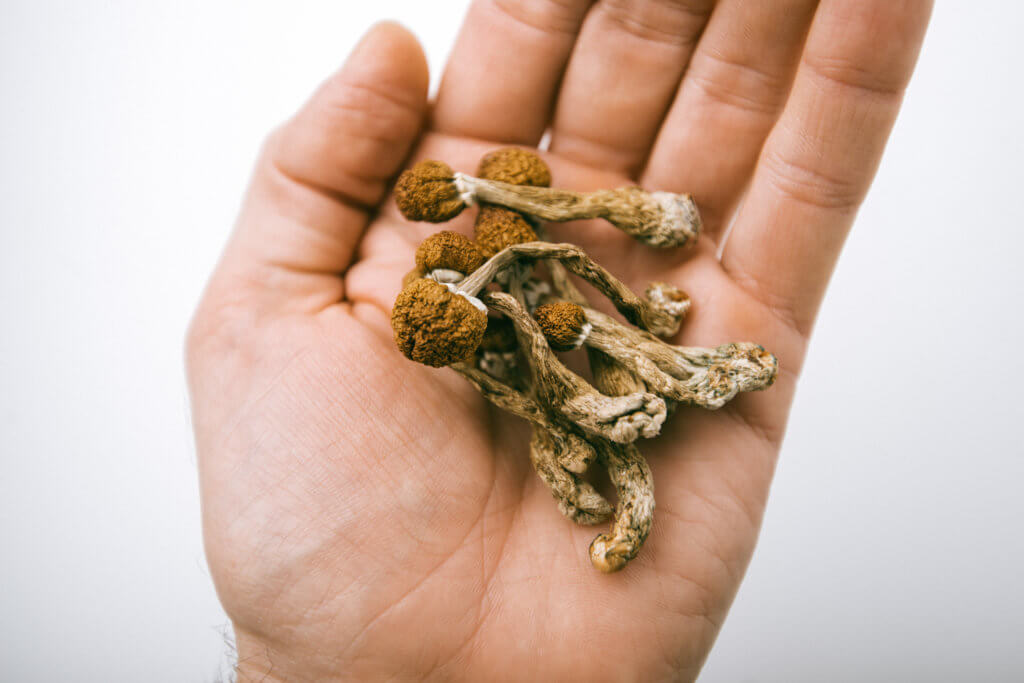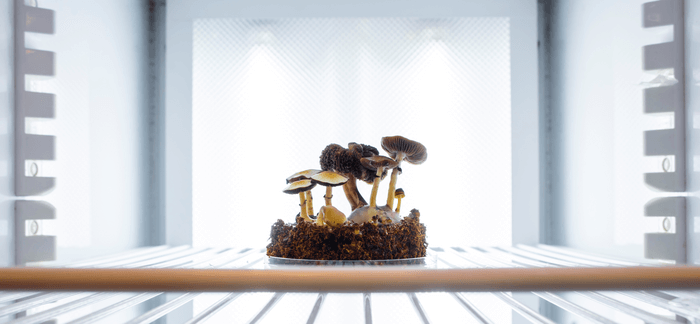PARIS, France — Control is a commodity that will always be in high demand. No one wants to feel like they aren’t in control of their own life and decisions. In this sense, Obsessive Compulsive Disorder (OCD) is an especially terrifying disorder. OCD patients often report feeling like they aren’t in control of their own thoughts. Now, researchers out of France are investigating the possibility of using psychedelic drugs like LSD and psilocybin to help treat OCD.
So, are a few magic mushrooms the key to overcoming OCD? The scientific jury is still very much out, but researchers from the Paris Brain Institute did find some evidence suggesting psychedelics can indeed soothe OCD symptoms in at least some people.
Characterized by intrusive thoughts, obsessions, and behaviors that often interfere with daily life and well-being, OCD can make people feel like they aren’t in control of their own minds. While the disorder varies in intensity from person to person, left unaddressed, OCD can spiral into a pattern of seriously unhealthy behaviors in many patients.
OCD symptoms are often accompanied by repetitive habits formed in response to an obsession, or unwanted repeated urges, thoughts, and mental images. Common obsessions among OCD patients include cleanliness (fear of germs), fear of losing or misplacing items, and taboo thoughts on topics like religion, sex, and violence. OCD is far from a rare condition; estimates show two and a half million American adults, or 1.2 percent of the U.S. population, live with a form of OCD.
Current OCD treatments mostly consist of cognitive-behavioral therapies (CBT) that encourage patients to change their thought patterns, in conjunction with prescribed antidepressants. Unfortunately, benefits are slow to appear from these treatments. In many cases, they never appear at all. Around 30 to 40 percent of OCD patients don’t respond to CBT at all.
“In this context, an option proposed in clinical research in the 1970s is now resurfacing: psychedelics, a family of psychotropic drugs,” says Anne Buot, a post-doctoral fellow in cognitive neuroscience, in a media release. “But since these substances are banned in many countries, clinical studies are difficult to set up, and we don’t have robust data on their effectiveness yet.”

Efforts to study the impact of psychedelics on OCD have proven difficult. To start, randomized, double-blind studies, considered the gold standard in clinical research, require encouraging preliminary data. Moreover, decades-long doubts regarding the efficacy of psychedelics, combined with possible media hype, may encourage recreational abuse (uncontrolled use by vulnerable patients lacking proper medical follow-up). Researchers add there is also the risk of diverting patients from psychotherapeutic interventions that may work for them.
Psychedelic drugs, when taken, induce an altered state of consciousness, allowing the user to see, perceive, and understand their world in a radically different way for at least a few hours. While psychedelic experiences are often overwhelming and sometimes upsetting, they can also foster the emergence of new, healthier thought patterns long after the trip is over.
Earlier research has shown the acute effects of psychedelics, present from the very first dose, contrast starkly with the delayed effects seen in continuous treatments like antidepressants.
“However, we don’t know whether there is a link between users’ subjective experience and actual therapeutic effects,” Buot adds.
Both LSD and psilocybin, the latter of which is derived from hallucinogenic mushrooms, show promise in the treatment of OCD.
“Among other things, these substances act on certain serotonin receptors,” psychiatrist Luc Mallet explains. “Unfortunately, even in animals, we don’t have sufficient data to predict their effectiveness.”

Study authors retrospectively analyzed the experience of people who had previously used psychedelic drugs. More specifically, they sought to better understand if users perceived an improvement in their OCD symptoms after taking LSD or psilocybin, as well as whether this effect was long-lasting, and if it could be predicted by any other factors.
In the absence of objective clinical data, researchers say there was no better way to assess the therapeutic potential of psychedelics than via the lived experiences of real-life patients.
“We recruited 174 people with OCD symptoms who had taken psychedelics either occasionally or regularly via an online questionnaire. We asked them about their mental health and the treatments they received—in addition to their socio-demographic characteristics,” Buot comments. “Then they were tasked to report on the context in which they had taken these substances, the dose, the nature of their psychedelic experience, and the perceived effects on symptoms.”
Participants reported the dissipation of obsessive thoughts, less need to engage in rituals, reduced anxiety and avoidance behavior, and greater acceptance of OCD.
“30% of participants reported that these positive effects lasted for more than three months, which is very encouraging,” Mallet notes. “Finally, we observed that the dose of LSD or psilocybin was positively correlated with the intensity of the psychedelic experience and its pleasantness.”
Still, the research team warns their findings should be interpreted with caution. Subjectively assessing the therapeutic effects of psychedelics can be impeded by a number of biases, such as the beliefs of a study’s participants.
“The population we studied generally has a very positive and enthusiastic attitude towards these substances, sometimes independently of their therapeutic effect. In addition, many patients are in situations of therapeutic impasse and expect LSD or psilocybin to improve their lives. This can significantly influence their testimony,” Mallet continues.
Researchers theorize the transformative symbolism of the psychedelic experience itself reinforces this bias. Some people enjoy euphoria, ecstasy, or connection with the universe while on these drugs, which is very different from their usual perception of the world.
“Understanding the extent to which the very nature of the psychedelic experience—strongly influenced by people’s history, culture, and imagination—affects the therapeutic effects will be essential,” Buot concludes. “To do this, we will need complementary approaches, in ethnography and psychology, for example.”
The study authors believe that in order to reach the full benefit of potential new OCD treatments, a number of additional, rigorous clinical studies must be conducted. Additionally, a greater understanding of the biological mechanisms underlying the long-term effects of psychedelics is needed. It’s been theorized that psychedelics actually increase neuroplasticity by facilitating the remodeling of synaptic connections, but this area is still very understudied.
The study is published in Scientific Reports.
You might also be interested in:
- OCD could be triggered by too much screen time in pre-teens
- How do ‘magic’ mushrooms get their psychedelic superpowers?
- Claims that cannabis compound THC-O-acetate is a psychedelic debunked


Incredible! Something positive that’s been known all along.
i don’t think that getting high is the answer to any of life’s problems and challenges….OCD ruminations can be reduced by vodka and/or fentanyl as well as by psilocybin but the treatment is worse than the disease.
i’m in favor of some kind of pharmacologic relief of mental illnesses but that relief should not include making the patient high or temporarily psychotic because the logic of treating mental illness by parachuting in another overlying mental illness seems not terribly convincing.
Is OCD an organic or a functional mental disorder. Is the tentative effect of LSD on OCD reported a psychological or a biological effect? Are there ever bad trips with LSD?
This article is like a walking down NYC with all the billboards and stupid, bizarre ads bombarding you. I know most articles have ads, but this is beyond ridiculous. They actually interfere with reading the article. Very bad experience.
It would be wise to interview the friends and family, as well. I am 100% certain my mushroom loving brother in law would tell a story lauding the benefits, but the overall effects in his life from substance abuse have been anything but good. Relief in the form of distortion of reality isn’t truly a cure. Having family members with OCD, the poor results from CBT mentioned are more likely from lack of access to therapists qualified to treat OCD. It is often slow to be correctly diagnosed and needs unique therapy, and few are available who truly know how to provide it. And that is after addressing the problems of insurance coverage and therapist shortages.
i have OCD in a very broad form and sometimes i get tics i was on adderall for about 8 years as a child and i’ve done LSD over 30 times and I dont think it improves OCD long term
My first “accidental” experience with LSD (over 50 years ago) changed me in a positive way. It removed the ego and I was able to see myself without judgement. My life was in a mess due to an ACE score of 5 (look it up). During my trip, I saw what was wrong and it was a relief to understand my problems. After this experience I changed my life and goals. I decided to go to college even though my father couldn’t offer financial help. I pulled up my grades and was admitted to a large state university. I paid my own way through college and graduated. Without the LSD I would have ended up in jail or been a detriment to society. All it took was that one “accidental” LSD trip and it wiped out many years of pain and depression.
Note: your mileage may vary.